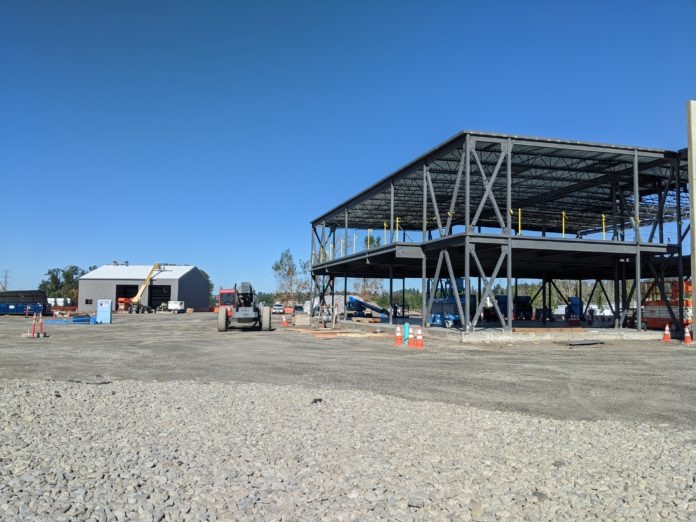
Fisher Construction Group has had to bring the full measure of its agility, resourcefulness and flexibility – essentially every tool they routinely offer clients – to constructing their new regional office at the Port of Vancouver USA.
Although the Burlington-based construction services firm expanded to Hazel Dell in 2018, work on a 12,400-square-foot two-story office building began in April of 2020. The project broke ground within weeks of the novel coronavirus first being detected in Washington. The pandemic had already begun slowing supply chains and the state had halted most construction while developing extremely strict requirements for personal protective equipment and social distancing protocols on sites.
While construction was nearly shut down across the state and much of the country, Fisher plowed forward. Most of the firm’s projects were considered essential, and the company adopted many safety measures even before they were mandated.
Fisher specializes in designing and building critical infrastructure for large scale food processing and cold storage, and if their projects didn’t continue even as the coronavirus spiraled into a worldwide pandemic, it would mean millions of pounds of spoiled food across the region and the nation.
Little did they know, the company would soon also be navigating the worst air quality in the world right here in Vancouver just as it was preparing for the new building’s steel erection in mid-September. When the wildfires began, said Project Manager Kevin Watkins, “we had no protocols in place. Within 24 hours, we had collaborated (company-wide) on how to protect employees and workers. We did end up shutting down a lot of our jobs.”
Ten straight days of hazard-level air quality and the threat of wildfires was followed by 10 straight days of significant Interstate 5 Bridge closures, doubling traffic tie-ups to an astounding 14 hours per day only a few miles from the company’s location on Northeast Repass Road.
Fisher purchased Vancouver-based Iso-Quip in 2018 to expand its thermal division and to locate a regional office near a large airport, with a relatively short-term goal of opening a full-service regional design/build operation in Vancouver. In addition, the company has several high-profile customers in the local region, including Henningsen Cold Storage, Lineage Logistics, Columbia Fruit, Firestone Pacific Foods and more. Fisher also has active projects in such states as Utah, Georgia, California, Virginia and Ohio. Sales range between $250 and $450 million annually, according to Watkins.
“We follow our customers all over the county, and this location suits us well for travel. It was a natural progression of our growth to move into Portland/Vancouver,” said Watkins.
Fisher’s new office building is not only a tribute to the design/build process the firm has refined since it opened in 1979, but it also showcases construction techniques and materials often used on Fisher Construction Group projects. The steel-frame building will be clad with insulated metal panels and feature concrete panel accents. It was built with the latest innovations in HVAC and energy and health efficiencies. But working under the threat of COVID has the project engineers considering UV filters that kill bacteria as it moves through the system.
At press time, Fisher had erected the steel and concrete blade wall on the office, and the shop was completely up and nearly finished with the roofing and siding. Bird friendly glass, required by the Port, will be installed throughout. By January, the first floor will be built out for its 35 current staff, and the second floor will be built out as hiring ramps up in the spring. The office could double both its personnel and office space within a year from now, said Watkins. Despite the challenges of an economic downturn and global pandemic, the company presses on.
“2020 has been a challenging year – an interesting year,” Watkins said. “And the way we’ve approached it is the way we approach all our projects. We meet any obstacle head on, we don’t shy away from it. We figure out a way to overcome those challenges.”



